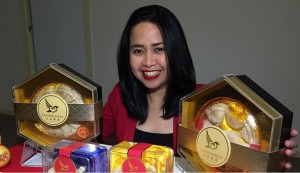Birds’ nests you can eat

Meryl Suaidy selling her edible birds’ nests from her successful business.
Edible birds’ nests are quietly emerging as one of Melbourne’s most coveted foreign delicacies.
The nests are created using solidified saliva and have been used in Chinese cooking for over 400 years due to their perceived health benefits and good luck.
Usually they are given as gifts during Chinese New Year or other special occasions, but with one kilo costing up to $7000 you’d hope the receiver was very appreciative.
The main areas for harvesting the nests, which mainly come from the edible-nest swiftlet, are in Indonesia and Malaysia, with Hong Kong and the Unites States being the largest importers.
In the late 1990s purpose-built nesting houses were created in order to keep up with the escalation in demand and to stop the harvesting from caves.
Their popularity has grown so much recently that the Malaysian government has begun micro-chipping nests with details about harvesting, packaging and transport in order to thwart counterfeiting.
Meryl Suaidy, who moved to Melbourne from Jakarta two and a half years ago, is one of the main suppliers of the nests in Melbourne.
Meryl got into the business in August last year when her friend decided to move back to Indonesia.
“My friend had started the business here because her father was an edible bird’s nest farmer in Sumatra,” said Meryl.
Since then the company has flourished, with Meryl recently having to move into a bigger house in order to have more storage space.
“For Chinese people in Australia the nests are very popular. But over the last two years there has been a huge rise in sales due to Caucasians becoming increasingly curious to try it for themselves.”
“They’ve become so popular that many competitors have popped up in Melbourne. We used to be one of the only suppliers but now there are many,” said Meryl.
The surge in sales could have to do with word spreading on the supposed health benefits.
“The nests are very good for skin and lung problems. A lot of asthmatics buy from me regularly.”
The rising accessibility along with Melbournites being eager to try the latest health food craze is a likely reason for the nests’ current success.
“We stock in many shops throughout Melbourne and also sell a lot online through our website.”
“If more and more people want to try edible birds’ nests then hopefully soon we will open our own store!”
Ruby Brown
AMES Australia Staff Writer












